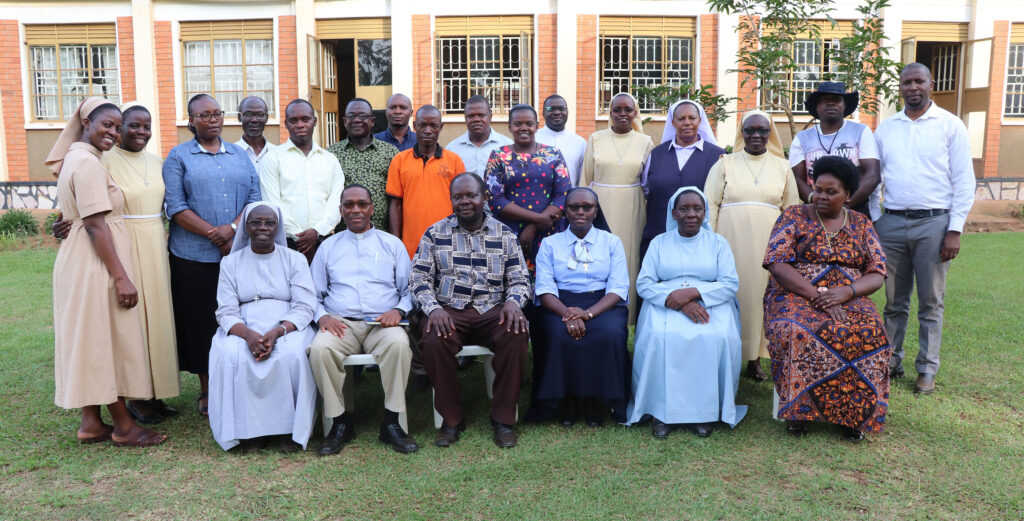AMECEA: A Pilot Survey in Uganda on Child Care Reform

Sr. Mary Lilly Driciru, MSMMC
A paradigm shift to make family the best place for the development of a child to full capacity, contrary to child care institutions which may hamper holistic child development, is constantly being embraced by the Association of Member Episcopal Conferences of Eastern Africa (AMECEA) region and beyond. The venture in place, which was introduced in 2016 is being embraced by Uganda, Kenya, Zambia, Malawi, and Sri Lanka is coming on board.
As the world is awakening to embrace the importance of reforming the care provided to children and vulnerable adults, AMECEA Region is not exceptional. With a growing focus on factors that contribute to family and human flourishing. This evolving trend signifies a shift from institutional care approaches towards embracing family and community-based care models. In recent years, institutes of consecrated persons have come together to advance care reform in a more concerted and collaborative way.
Guided by the theme: Strengthened Families Towards Sustainable Care Reforms, the Association of Religious in Uganda- Catholic Care for Children Uganda (ARU-CCCU) and Uganda Episcopal Conference -UEC co-hosted the team from Kenya. These included; Mr. Bernard Mberere, Sr. Jane Wairimu, Sr. Jecinter Okoth, from AMECEA Communications Department, Sr. Delvin Mukhwana, and Mr. Brighton Amuni from Catholic Care for Children Kenya-CCCK.
On arrival, the teams from AMECEA, CCCK, CCCU, and representatives from ARU met at Uganda Catholic Secretariat with the team from UEC. The members from UEC included the Secretary-General Msgr. John Baptist Kauta, Fr. Frederick Tusingire (Director Lay Apostolate Office, Fr. John Baptist Kaganda, (Pastoral Coordinator). After introductions, Sr. Euphrasia Masika, DST, Country Director CCCU gave opening remarks and said CCCU which started in 2016 has become a champion in the reunion of children to families or family-like environment. Unfortunately, children face more abuse in families than in childcare institutions.
After 1,443 children were taken back to families from childcare institutions, Uganda is championing childcare reforms followed by Kenya, Zambia, Malawi, and Sri Lanka. Due to high levels of poverty, families need to be strengthened with income-generating activities and positive parenting before hosting a child.
“AMECEA Communications Department which has been key in amplifying information about Child Care Reforms has come to carry out a pilot survey on re-integration program. This involves transitioning model of Catholic Care for Children reforms by reintegrating the children from child institutional care to family or community-based care. Close collaboration with the Church ministers is key. The involvement of the Church structure was mistakenly alienated and is now being integrated into the process of transition of a child from institution to family,” Sr. Euphrasia explained.
“The reason why the Communication Team from AMECEA has come is to witness the case closure of a child from St. Philomena Babies home, Iganga. They are a leading home in Uganda because out of 54, they are only left with 11 children. They successfully transitioned the children to natural families! The objective of this initiative is to bolster understanding and knowledge surrounding reintegration within child care reform and the strengthening of families, achieved through collaborative efforts with pertinent stakeholders.” Sr. Euphrasia concluded.
In the same vein, Msgr. Kauta welcomed the guests to Uganda and assured them of the good works Catholic Church is rendering and that the child care service of the Sisters cannot be underestimated. Many people including prominent members of the Church and society have benefited from the child care service of the sisters. He added that there is need to work hard to stop child abuse in various forms and or perpetrators face penalty for abuses.
On the part of AMECEA, Mr. Mberere assured the participants that the regional office does promote holistic service to children by ensuring that children are in family or similar setting for their good. The program brings other pastoral agents on board.
“We would like to document success stories and challenges and journey in synodality with all. We shall share the reports with the Bishops about the journey of the sisters with children. There is need to bridge the gap between sisters, Christian community and the parish. Some people are even resisting the closure of CCCIs,” Mr. Mberere exclaimed.
Sr. Delvin added that spirit of synodality which is stakeholders journeying together, resonates well with CCC movement.
“How best can the spiritual leaders help the movement? Why are families failing to take care of their children? When did the rain start beating us? There is need to have conversation with the roots in child care movement, partnering and collaboration. This involves stakeholders such as Small Christian Community (SCCs), traditional leaders, agents of evangelization and government stakeholders such as the social welfare office. This would take us to another level as far as child care movement is concerned.” She concluded.
Sr. Geneveve DaSilva, on behalf of ARU said, “a golden chance has come to realize how family is important for child care. Thanks to Ugandan group to take the challenge. Orphans have a back spot that makes them vulnerable. There is need to study their challenges step by step; their needs, parenting, psychology and family.”
The group then left for the Diocese of Jinja to carry out the mission and purpose for which they converged. ARU-CCCU selected St. Philomena Babies Home from the 19 CCIs as a pilot CCI to showcase the phases of care management including but not limited to identification, assessment, enrolment, case planning, care implementation/interventions, monitoring and evaluation, and case closure.


